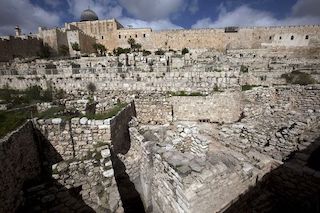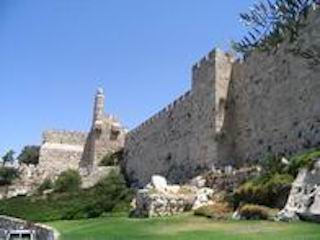

Click Image to See YouTube
In fact, the only way one can join the Skull and Bones is if one is invited by inside members. Every year, only 15 members are allowed to enter which is very mysterious because many popular figures throughout history have been members of this secret society.
Though the Skull and Bones is well known, many still do not know much about this secret society and how powerful it really is. Many think it’s just a secret society at Yale but they don’t know that the U.S. gov is actually full of members of this secret society.
Poetry isn’t my or my friend Curt’s forte (that’s the guy that’s helping me with this blog). And we knew very little about it, but at times I dabble with words. The Book of Lamentations is very sad, but they should have listened to You. I know my friend Curt is very glad he didn’t end up like Jerusalem, like verse 17 says.
I gotta tell You though, he was a real loser. He never cared that much about others and He thought You and the devil were as real as a three dollar bill. He believed that there are two types of people, givers and takers, and he wasn’t about to be a giver because he thought they were the weak ones.
He never worshiped false gods or anything like that, he was just a manipulator and con artist, which is just as bad. He was heading for hell when he finally decided to call You, and Wow! He couldn’t believe it when You answered, and You picked the phone up on the first ring.
Until he got to know You he didn’t realize there were so many different evil organizations, such as the Church of Satan, the Illuminati, the Synagogue of Satan, Skull and Bones and the list goes on and on.
We just recently learned about…
Lamentations 1
Jerusalem’s Desolation
Jerusalem, lonely and desolate.
1 How doth the city sit solitary that was full of people! how is she become as a widow! she that was great among the nations, and princess among the provinces, how is she become tributary!

he present city wall was constructed in 1538 AD by the Ottoman ruler Suleiman the Magnificent above the ruins of the old 1st century walls that stood when Jesus lived.
Over the centuries since the 16th century wall was built, eleven gates have guarded the entrances to the nearly three-mile long fortified perimeter of the Old City of Jerusalem and to the most sacred area of the city, Jerusalem’s Temple Mount. Today only seven of these gates are opened.
2 She weepeth sore in the night, and her tears are on her cheeks: among all her lovers she hath none to comfort her: all her friends have dealt treacherously with her, they are become her enemies.
3 Judah is gone into captivity because of affliction, and because of great servitude: she dwelleth among the heathen, she findeth no rest: all her persecutors overtook her between the straits.
4 The ways of Zion do mourn, because none come to the solemn feasts: all her gates are desolate: her priests sigh, her virgins are afflicted, and she is in bitterness.
5 Her adversaries are the chief, her enemies prosper; for the LORD hath afflicted her for the multitude of her transgressions: her children are gone into captivity before the enemy.
6 And from the daughter of Zion all her beauty is departed: her princes are become like harts that find no pasture, and they are gone without strength before the pursuer.
7 Jerusalem remembered in the days of her affliction and of her miseries all her pleasant things that she had in the days of old, when her people fell into the hand of the enemy, and none did help her: the adversaries saw her, and did mock at her Sabbaths.
8 Jerusalem hath grievously sinned; therefore she is removed: all that honored her despise her, because they have seen her nakedness: yea, she sigheth, and turneth backward.
9 Her filthiness is in her skirts; she remembereth not her last end; therefore she came down wonderfully: she had no comforter. O LORD, behold my affliction: for the enemy hath magnified himself.

10 The adversary hath spread out his hand upon all her pleasant things: for she hath seen that the heathen entered into her sanctuary, whom thou didst command that they should not enter into thy congregation.
11 All her people sigh, they seek bread; they have given their pleasant things for meat to relieve the soul: see, O LORD, and consider; for I am become vile.
12 Is it nothing to you, all ye that pass by? behold, and see if there be any sorrow like unto my sorrow, which is done unto me, wherewith the LORD hath afflicted me in the day of his fierce anger.

The walls and tower were repeatedly built and destroyed over the past 2,100 years, and protected the north-west corner of the “upper” city.
13 From above hath he sent fire into my bones, and it prevaileth against them: he hath spread a net for my feet, he hath turned me back: he hath made me desolate and faint all the day.
14 The yoke of my transgressions is bound by his hand: they are wreathed, and come up upon my neck: he hath made my strength to fall, the Lord hath delivered me into their hands, from whom I am not able to rise up.
15 The Lord hath trodden under foot all my mighty men in the midst of me: he hath called an assembly against me to crush my young men: the Lord hath trodden the virgin, the daughter of Judah, as in a winepress.
16 For these things I weep; mine eye, mine eye runneth down with water, because the comforter that should relieve my soul is far from me: my children are desolate, because the enemy prevailed.
17 Zion spreadeth forth her hands, and there is none to comfort her: the LORD hath commanded concerning Jacob, that his adversaries should be round about him: Jerusalem is as a menstruous woman among them.
18 The LORD is righteous; for I have rebelled against his commandment: hear, I pray you, all people, and behold my sorrow: my virgins and my young men are gone into captivity.

The gate is located on the south-west side of the old city.
19 I called for my lovers, but they deceived me: my priests and mine elders gave up the ghost in the city, while they sought their meat to relieve their souls.
20 Behold, O LORD; for I am in distress: my bowels are troubled; mine heart is turned within me; for I have grievously rebelled: abroad the sword bereaveth, at home there is as death.
21 They have heard that I sigh: there is none to comfort me: all mine enemies have heard of my trouble; they are glad that thou hast done it: thou wilt bring the day that thou hast called, and they shall be like unto me.
22 Let all their wickedness come before thee; and do unto them, as thou hast done unto me for all my transgressions: for my sighs are many, and my heart is faint.
Acrostics and Other Techniques
of Ancient Poetry
All pottery, except perhaps free verse, maintains some kind of repetition. Sometimes it is metrical, as in iambic pentameter; based on rhyme; or based on the number of syllables per line, as in ncient.

Homer’s ancestry can be traced from Odyssey. He was the son of Epikaste and Telemachus. Born around 8th – 9th century B.C. he was said to be a court singer and a story teller.
Even if these details about Homer are available, not much is know about him. In fact his existence is somewhat doubted. Some say he was born on the island of Chios while argue that he existed in Ionia. But the dialect and the description in the poems pointed that Homer lived in Ionia.
Biblical Hebrew poetry didn’t employ rhyme and although there is some dispute about this issue, probably didn’t use meter or syllable counting. Long ago scholars recognized that ancient Hebrew poetry often employed parallelism, which may be loosely described as “saying the same things twice.”
Lam 2:7 illustrates the principle:
The Lord hath cast off his altar,
He has abhorred his sanctuary.
Each line contains a subject, “Lord” (understood but not explicitly mentioned in line 2), a verb (has rejected/[has] abandoned) and a direct object (his altar/his sanctuary), and each direct object is composed of a pronoun and a noun.
This is often called “synonymous parallelism.” Yet Hebrew parallelism is often much more complex and subtle than the above example suggests (e.g., contrasting thoughts are often used as well, such as in Prov 22:12).
Also, not all Hebrew poetry uses synonymous parallelism, nor is all synonymous parallelism poetry; it can occur as well in Hebrew pose.

Biblical Hebrew makes use of several other devices to establish the repetition poetry requires. Certain words may be repeated across several lines, or consecutive lines of poetry may be with the same Hebrew letter.
Another device is “inclusion,” in which the first and last lines of a poem or strophe (also called “stanza,” it refers to a major division in a poem) are identical, and the main topic is elaborated between them (e.g., Ps 8).
Sometimes a Hebrew poem will repeat a full line at every other line, as in Ps 136. It appears that Hebrew poetry follows certain constraints regarding, for example, the number of verbs allowed per line; this too can create poetic symmetry.
Sometimes a Hebrew poem may be an acrostic. The first letters of each consecutive line or strophe, taken in total, list the Hebrew alphabet in order. For example, the first verse of Lamentations 1 begins with aleph (the first letter of the Hebrew alphabet.

While the subject matter of his poetry covered traditional themes like marriage (epithalamium), Catullus was a new or neoteric poet who also wrote personal poems about the loves (and hates) of his life.
Some of the poems are filled with invective. One of these warns the reader to avoid making judgments about the poet based on the poet’s poems. Despite this, of the limited amount we know about Catullus, some of it does come from his poetry.
Catullus is thought to have come from an equestrian family from Verona, and to have lived from about 84 to c. 54 B.C., mostly in Rome.
The second verse with beth (the second letter of the alphabet). The third with gimel (the third letter), and so forth. Fundamentally, the acrostic is a type of repetition used in some Hebrew poetry.
Our understanding of Hebrew poetry is limited by the fact that no one living today has ever heard how it was originally sung. Sadly, much of the oral art of Hebrew poetry has been forever lost to us.
…Scientology.
Visits: 0
